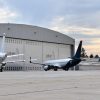 As the aviation industry continues to experience fast-paced changes, so do the needs and expectations of passengers. Airports and global airlines have done some impressive work on addressing pervasive issues experienced before and during the pandemic to enhance passenger experience with air travel.
As the aviation industry continues to experience fast-paced changes, so do the needs and expectations of passengers. Airports and global airlines have done some impressive work on addressing pervasive issues experienced before and during the pandemic to enhance passenger experience with air travel.
However, airlines must put extra effort, particularly in handling passengers with additional needs. Many airports are reporting rising numbers of passenger requests for charter travels and assistive services, which if not addressed may render it challenging to achieve the expected improvements in air travel.
The industry must make the necessary upgrades to increase its responsiveness to the changing needs and expectations among air travelers.
With the expected surge in air passenger travel, global airlines should consider ACMI (Aircraft, Crew, Maintenance and Insurance) plans as a strategy to offset the increasing demand for air travel services during the 2022 season. To achieve this, airlines companies that cannot meet the current demand for air travel services should wet-lease passenger jets from other aircraft owners and increase their daily flights to various destinations.
ACMI business model presents significant opportunities for airlines to increase capacity without incurring financial burdens. According to Boeing data from 2019, over 40% of commercial aircraft used by airlines are subject to operating leases.
Adopting ACMI leasing plans offers an adaptable solution for airlines to achieve flexibility in capacity management, respond to operational disruptions, and improve customer satisfaction by minimizing passenger delays. At the same time, such plans provide a means to deliver cost advantage and increase responsiveness to extraordinary situations that may encumber airline operations. Airline carriers can initiate wet leases as a quick response to interim demands and capacity requirements changes.
Given the increased demand for competitive pricing and increased attractiveness of the ACMI leasing market, global airlines may wish to pursue this strategy as their point of departure before returning to the full-scale restoration of their internal operations.
As an example, companies like Bamboo Airlines have used the ACMI strategy to test new markets by leasing two Embraer E195s aircraft. Through wet leasing, Bamboo Airlines has introduced wide-body aircraft which can operationally fly and supplement its core narrow-body fleets.
One of the key lessons learned from the COVID-19 pandemic is that there are no centrally regulated online spaces for filling forms. For airlines to restore safety in the aviation system, the IATA demands that all supply chain partners, including airlines, ANSP, and ground handlers, ramp up their recovery plans and ensure compliance with regulatory requirements to avoid any setbacks throughout the recovery.
IATA has provided regulations for the restart of airline operations during the pandemic. One of such regulations requires passengers to present COVID-19 PCR test certificates and Travel Code (TT) certificates at the boarding gate before traveling to various destinations. However, the IATA, European Union Agency, and Airlines for Europe (A4E) have warned that the absence of a centrally regulated online space for disseminating COVID-19 travel certificates and other aviation regulations amounts to a “worrying patchwork of approaches” which may increase inefficiencies in the global aviation industry.
Thus, there is a need for a regulated digital application integration that will replace electronic forms used by air passengers for regulatory submissions. This will make future form-filling easier and increase efficiency in the submission and handling processes.
Currently, airline companies and partners have embarked on a rigorous process of developing resource management systems to support integrated process management and achieve seamless operations. For example, Sensus Aero is an integrated and scalable digital platform that provides next-generation solutions for airlines to increase process efficiency, enhance scenario conception, support custom timetables management, error prevention, graphical real-time monitoring, and automatic synchronization of Passenger Announcements (PA), Flight Information Display Systems (FIDS), Airport Operational Database (AODB), de-icing, and fueling modules.
Further, the introduction of AI algorithms, machine learning (ML), and neural networks have offered an opposite solution to improve process efficiency in aviation operations by reducing the need for human-machine interactions. This is particularly important in ensuring safe ground handling operations where the reported and unreported damage and accidents pose the highest risk to flight safety.
The surging demand for passenger air travel represents a new post-pandemic reality that the aviation industry must respond to or risk stalling. If left unchecked, the situation may escalate and impede the ambitious target to improve operational efficiency, increase flight safety, and achieve seamless operations in the global aviation sector. Aviation players must implement continuous upgrades in their operational strategies and internal systems to drive efficiency, address capacity issues, and address any problems that contribute to ineffective internal processes.





